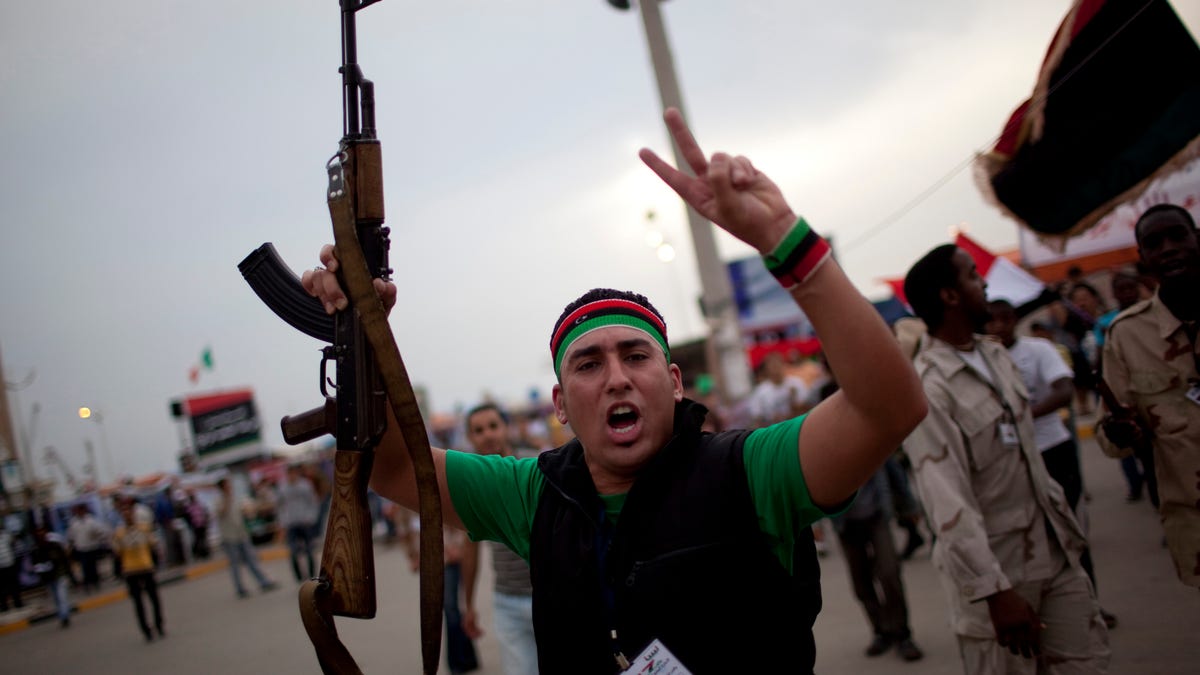
A man chants anti-Muammar Qaddafi slogans during a protest in the rebel strong hold of Benghazi, Libya, Thursday, June 2, 2011. (AP) (AP2011)
The U.S. House formally rebuked President Obama Friday for his handling of the war in Libya, though lawmakers stopped short of calling for a withdrawal of U.S. forces.
In a 268-145 vote, the House approved a resolution by House Speaker John Boehner calling on the White House to provide more information on the mission within two weeks and stating for the record that Obama has not gotten permission from Congress. It accuses the president of failing to provide a "compelling rationale" for intervention, and also prohibits U.S. ground forces from being introduced in most cases.
Though the measure only reflects the view of the House and does not have the force of law, Boehner described it as a "first step" and threatened to take further action.
"This resolution puts the president on notice," Boehner said on the floor. "He has the chance to get this right, and if he doesn't, Congress will exercise its constitutional authority and we will make it right."
Boehner pulled together the resolution as an alternative to a harsher one offered by Rep. Dennis Kucinich, D-Ohio, calling for an end to U.S. involvement in the operation. That proposal failed on a 148-265 vote, though more Republicans than Democrats supported it.
Boehner said the Kucinich resolution went "too far," and predicted such a withdrawal would "undermine our troops and our allies." Even House Democratic Leader Nancy Pelosi criticized the Kucinich resolution, though she also criticized Boehner's.
Some described Boehner's resolution as a meaningless gesture.
"Pursuing a non-binding House resolution that takes potshots at the president and amounts to nothing more than a sense of the Congress is just an exercise in political gamesmanship. It is a pedantic effort to embarrass the president without taking any ownership of the policy of the intervention," said Rep. Howard Berman, D-Calif., ranking Democrat on the House Foreign Affairs Committee.
But the House action puts pressure on Obama to give Congress a clearer picture of where the mission is headed and when it might end. The president launched the operation in Libya, along with NATO allies, nearly three months ago to stop Muammar al-Qaddafi from slaughtering his people in the face of a rebellion.
The air strikes have helped keep Qaddafi at bay, but U.S. lawmakers have complained the administration has not defined for them what exactly the military operation is meant to achieve. Though the White House wants Qaddafi to step down, U.S. officials claim the NATO operation is not personally targeting him.
Meanwhile, some lawmakers have accused the president of ignoring the 1973 War Powers Resolution requiring the president to seek congressional approval for military action within two months. That deadline passed last month, but the White House continued to insist it was acting in compliance with the law because it was consulting with Congress.
"It is the view of this administration that we've acted in accordance with the War Powers Act because of this regular consultation. We've been engaged in that consultation all along ... three separate briefings have been held just this week for members of Congress. We're committed to that moving forward," White House spokesman Josh Earnest said Friday.




